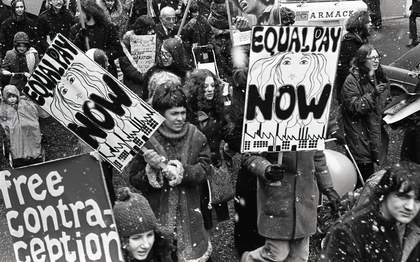Collective practices have been pivotal to feminist creative and activist efforts. In the 1970s and 80s, many women artists embraced group work as a means of mutual support, unlocking creative potential, and combating patriarchal individualism.
Featuring Women in Revolt! artists including Ingrid Pollard from Lenthall Road Workshop, Maggie Murray from Hackney Flashers and Format Photographers Agency, Roshini Kempadoo from Format and Autograph alongside Women's Art Library curator Althea Greenan, this panel discussion highlights pioneering feminist collective art practices. These artists adopted group work to challenge conventional gender norms and address the systemic undervaluing of 'women’s work'.
Chaired by journalist Moya Lothian-McLean, this event aims to reflect on the enduring relevance of collective practice, and ask: How can the alternative economies forged by these artists inspire contemporary efforts for gender equality and social change?
Dr Althea Greenan
Dr Althea Greenan works in Special Collections and Archives at Goldsmiths University of London curating the Women’s Art Library (WAL) collection. She programmes artistic research through supporting artists, students and academics working with the wide range of materials and archives in the WAL This work is the subject of a film by Holly Antrum commissioned by the Art360 Foundation titled Yes to the Work!: The Women’s Art Library.
Additional roles include co-curating the Animating Archives website and sitting on the Advisory Board of Feminist Art Making Histories, an oral history, digital humanities project, funded by the Irish Research Council and the AHRC.
Roshini Kempadoo
Roshini Kempadoo is a media artist, photographer and scholar. Her research, multimedia and photographic projects combine factual and fictional re-imaginings of contemporary experiences, histories and memories. She was instrumental in setting up Autograph, the Association of Black Photographers in the late 1980s, and worked as a documentary photographer for Format Picture Agency (1983 – 2003).
Maggie Murray
Maggie Murray was a documentary photographer, a member of the Hackney Flashers Collective and a founder member of Format Photographers Agency which, uniquely, represented only women photographers (1983 - 2003). Maggie’s work is currently included in Tate Britain’s ‘Women in Revolt’, and in the Barbican’s recent exhibition RE/SISTERS. Her archive, together with the Hackney Flashers’ and Format’s, is held at the Bishopsgate Institute in the City of London.
Ingrid Pollard
Ingrid Pollard is a photographer, media artist and researcher. Her practice is concerned with representation, history and landscape with reference to race, difference and the materiality of lens based media. In the 1980s, Pollard was a member of the Lenthall Road Women’s Workshop. She is a founding member of the Association of Black Photographer (now Autograph ABP). Her work is included in numerous collections including the UK Arts Council and the Victoria & Albert Museum.
Moya Lothian-McLean
Moya Lothian-McLean is a journalist and broadcaster, with a focus on politics and underrepresented voices. She is currently a Contributing Editor at Novara Media and writes regularly for the New York Times and The Guardian among others. She is the host of Human Resources, a podcast exploring the history of Britain's role in the transatlantic slave trade.
Tate Britain's step-free entrance is on Atterbury Street. It has automatic sliding doors and there is a ramp down to the entrance with central handrails.
The Exhibition is on the Lower floor of the gallery.
- Accessible, standard and Changing Places toilets are located on the Lower floor.
- Ear defenders can be borrowed from the ticket desk on the Lower floor.
To help plan your visit to Tate Britain, have a look at our visual story. It includes photographs and information about what you can expect from a visit to the gallery.
For more information before your visit:
- Email hello@tate.org.uk
- Call +44 (0)20 7887 8888 (daily 10.00–17.00)

